Qatar Hopes Iran-US Prisoner Deal Leads To Nuclear Talks

Qatar has expressed hope that a recent Iran-US prisoners exchange agreement his country brokered leads to a wider dialogue on Iran's nuclear program.

Qatar has expressed hope that a recent Iran-US prisoners exchange agreement his country brokered leads to a wider dialogue on Iran's nuclear program.
Qatari Prime Minister and Foreign Minister Sheikh Mohammed Bin Abdulrahman Al Thani made the remarks on Friday, saying, "With Iran, we became a key mediator with the US in the prisoner swap agreement which we hope will lead to a wider dialogue on the nuclear deal."
During a media briefing earlier in the week, Qatar's Foreign Ministry spokesperson Majed bin Mohammed al-Ansari underlined Doha’s important role in achieving consensus between the two sides and facilitating communication with various stakeholders for the implementation of the agreement.
The deal entails the release of five American prisoners detained in Tehran in exchange for the liberation of five Iranian prisoners held in the United States as well as the release of $6 billion of frozen Iranian assets.
As a first step in this deal – which followed a two-year mediation effort by Qatar and Oman -- Iran on August 10 released four imprisoned US citizens from Evin prison into house arrest, where they joined a fifth already under home confinement.
These include businessman Siamak Namazi, 51, Emad Sharqi, 58, and environmental activist Morad Tahbaz, 67, who holds British nationality in addition to Iranian citizenship. The identities of the fourth and fifth Americans who either left prison or were under house arrest have not been disclosed.
World powers were in talks in Vienna for months to revive the 2015 Iran nuclear deal. The negotiations collapsed in March over Tehran’s demands that Revolutionary Guards be removed from a US list of foreign terrorist organizations and ‘guarantees’ to cushion its economy and nuclear program from the US again leaving the the Joint Comprehensive Plan of Action.
The Biden administration has been striving to bring the United States back into the JCPOA, a deal that was previously abandoned under the Trump administration.
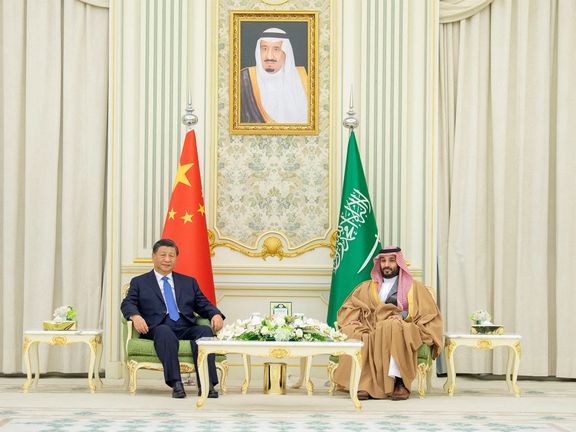
As Saudi Arabia continues to pursue an ambitious nuclear program, it has turned to China to pressure Washington as US talks stall.
The Kingdom’s bid to reach parity with Iran, in spite of revived diplomatic relations this year, is driving the Persian Gulf’s oil powerhouse to reach out to China, according to the Wall Street Journal.
Saudi Arabia has asked the US to help it develop a civilian nuclear program as part of a potential deal that would include diplomatic normalization with Israel, which Riyadh doesn’t recognize. Saudi Arabia is also asking the US to provide security guarantees for the kingdom as part of such a deal.
It is causing dilemmas for the United States, which is walking a tightrope in the region, with continuing tensions with Iran and an ever-hungrier Saudi Arabia seeking uranium enrichment on its home soil.
Bypassing the US in favor of China, which earlier this year was a major part of the negotiations to reinstate diplomatic relations between Iran and Saudi, is a firm statement that with or without President Joe Biden’s agreement, Riyadh will do all it can to forge its way into the nuclear domain.
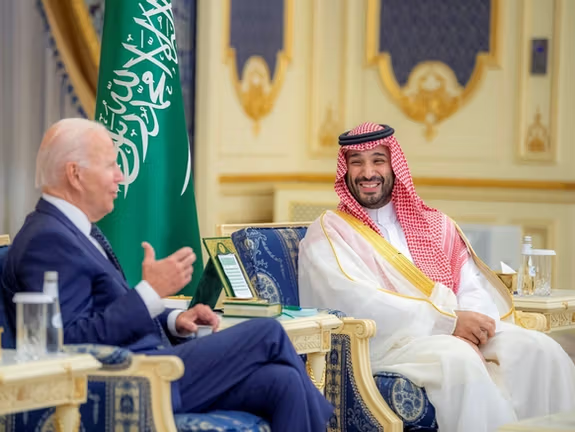
According to Israel’s Haaretz, leading American and Israeli experts are warning the Biden administration not to accept Saudi demands for uranium enrichment as part of a future US-Saudi-Israeli normalization agreement, for fear it will build its own nuclear weapons.
The fears emerged after Israel’s Strategic Affairs Minister Ron Dermer did not rule out Saudi uranium enrichment during an interview with PBS. He argued the Saudis could go to China or France to set up a native nuclear enrichment program, suggesting it would be better to have the US, Israel’s most important ally, involved.
A Saudi-Israel deal, alongside the shadow war with Iran, is atop Israeli Prime Minister Benjamin Netanyahu’s agenda, and many in Israel fear he will reach it at any cost as he approaches the end of his decades-long political career.
Opposition leader Yair Lapid said this week: “It is clear to everyone that if they [Saudi] start enriching uranium in the Middle East, everyone will want to."
Until now, the US has said American nuclear aid is contingent on the Saudis agreeing to not enrich their own uranium or mine their own uranium deposits in the kingdom—non-proliferation conditions not sought by China, which has been seeking to strengthen its influence in the Middle East.
China National Nuclear Corp., a state-owned company known as CNNC, has bid to build a nuclear plant in Saudi Arabia’s Eastern Province, near the border with Qatar and the United Arab Emirates, according to the WSJ, which claims the dealings with China are a pressure tactic on Washington as the two nations drifted further apart since the Biden administration came to power.
Biden promised to make Saudi a ‘pariah state’ after the brutal assassination of US-Saudi journalist Jamal Khashoggi, which has caused years of tension between Biden and Saudi’s de facto ruler, Crown Prince Mohammed Bin Salman.
Crown Prince Mohammed Bin Salman has made obtaining nuclear power a priority. After a decade of discussions, the Saudis are now impatiently pushing to award a contract for the Eastern Province plant, known as Duwaiheen—a two-reactor, 2.8-gigawatt facility—by the end of 2023 and eventually construct 16 reactors at a cost of some $80 billion to $100 billion.
Driven by the desire for parity with Iran in addition to looking towards a time when the kingdom’s main export, oil, is no longer a viable revenue source and nuclear power would offer a viable alternative, time is now ticking. MBS has made no secret of his willingness to develop nuclear weapons if Iran does.
China has already helped Riyadh build its own ballistic missiles and helped the Saudis with a facility for extracting uranium yellowcake from uranium ore, an initial step toward enriching uranium.
There is no doubt that Saudi Crown Prince has his eye on being the region’s political powerhouse, a fact which has more recently created tensions with the UAE’s President and MBS’s initial mentor on his rise to power, Mohammed Bin Zayed.
Close allies of the US such as the UAE and South Korea have accepted stronger restrictions on their nuclear programs and will see US support for enrichment on Saudi soil as a justification to demand the same.
Where the Israeli factor plays into the next stages of the race to nuclear is yet to be seen, the Prime Minister’s office claiming hours after Dermer’s comments that it will not allow any of its neighbors to develop nuclear weapons, but there seems no doubt that Saudi Arabia will get its way, whatever the cost.
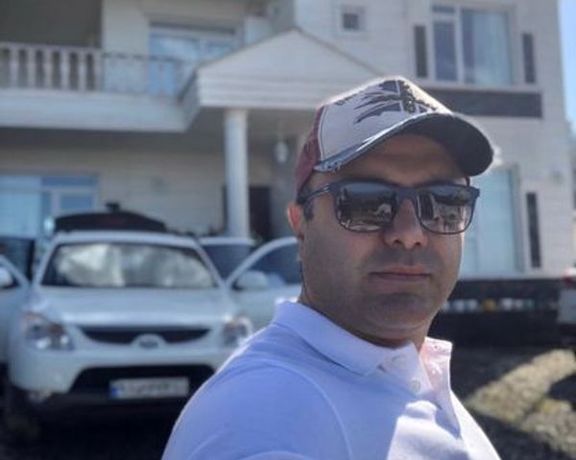
A 42-year-old Iranian citizen, who holds Dutch citizenship and lives in the Netherlands, has been detained in Tehran over suspicions of holding dual nationality.
According to information received by Iran International, Saeed Farahani had his passport confiscated upon entry into Iran two months ago. He was then summoned to judicial authorities and went to Evin Court but was arrested and detained earlier in August.
Since his arrest, Farahani has had no contact with his family, and his current status remains unknown.
It appears that he was detained due to suspicions of holding dual citizenship, but information received by Iran International indicates that he does not possess dual citizenship.
For many years, the Islamic Republic has detained Iranian citizens who reside abroad or who hold dual citizenship in an attempt to exert pressure on Western governments and to secure concessions in exchange for the release of these citizens.
Recently, Tehran and Washington reached an agreement that would secure the release of five American hostages imprisoned in Iran in exchange for the Islamic Republic gaining access to $6 billion of its blocked assets that were frozen in South Korea.
Commenting on this recent deal, Jake Sullivan, the White House National Security Advisor, stated that the US believes the potential agreement for the release of these five imprisoned American citizens by Iran is still on track, but he refrained from providing a timeline.
Based on this agreement, individuals such as Siyamak Namazi, Emad Sharghi, Morad Tahbaz, and two other unnamed American citizens are to be released. These individuals have already been placed under house arrest until the release deal is finalized.
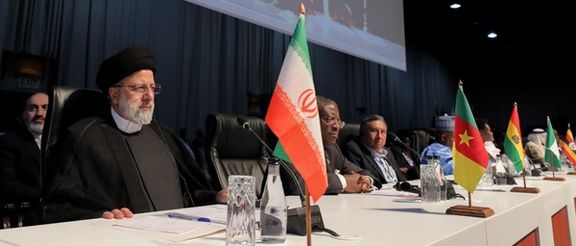
Iranian and Chinese presidents met on the sidelines of the BRICS summit Thursday and emphasized the importance of bilateral and multilateral cooperation, Tehran said.
The official government news agency IRNA carried a report on the summit headlined by a quote by President Ebrahim Raisi saying, “Iran’s membership in the bloc is opposition to American unilateralism.”
The BRICS group of nations reached a broad consensus to invite six countries - Argentina, Egypt, Iran, Ethiopia, Saudi Arabia and the United Arab Emirates - to join, in a move aimed at increasing the clout of a bloc that has pledged to champion the "Global South".
This is a historic expansion, which reflects the determination of BRICS countries to unite and cooperate with other developing countries, Xi said at the group's leaders' summit in South Africa's Johannesburg.
"This expansion meets the expectations of the international community and serves the common interests of emerging markets and developing countries," Xi added.

Raisi told the summit Iran Iran supports efforts by the BRICS group of emerging economies to move away from dependence on the US dollar.
"The Islamic Republic of Iran very resolutely supports the successful endeavors of BRICS in line with de-dollarization from the trade and economic interactions between the members and also making use of local currencies," he said.
Amid its economic isolation from the West and having few trading partners worldwide, the Islamic Republic views BRICS as a possible savior, with continuous propaganda domestically to present its membership as a critical accomplishment.
However, individual countries make economic decisions based on their interests and they see Iran, which is under US banking sanctions, as a risky proposition. The Islamic Republic has also created a heavily government controlled economic system not conducive to foreign investments.
In his meeting with China’s XI Jinping, Raisi emphasized that the invitation for Iran to join BRICS highlights the bloc’s opposition to the United States, and expressed hope that relations with China will be boosted. Tehran already has a 25-year cooperation agreement with Beijing, with details kept mostly secret, but Iranian officials have often referred to a Chinese pledge to invest $400 million in their country. However, in more than two years after the deal was officially concluded there is little sign of any investments.
IRNA quoted President Xi as having told Raisi that his country hopes to expand bilateral cooperation with Iran “to strengthen multilateralism.”
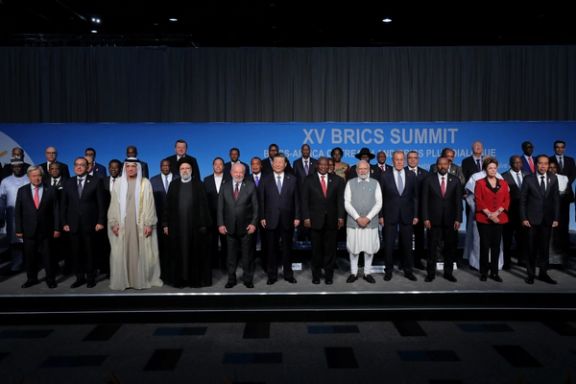
BRICS - whose acronym was originally coined by an economist at Goldman Sachs, currently comprises Brazil, Russia, India, China and South Africa.
Deepening geopolitical polarization in the wake of Russia's invasion of Ukraine and China's declining relations with the United States are spurring efforts by Beijing and Moscow to forge BRICS into a viable counterweight to the West.
"BRICS has embarked on a new chapter in its effort to build a world that is fair, a world that is just, a world that is also inclusive and prosperous," said South African President Cyril Ramaphosa, who is hosting a summit of BRICS leaders.
Henry Rome, Senior Fellow and Iran analyst at the Washington Institute, commented,“Iran’s invitation to the BRICS group likely will provide little in terms of practical benefits. But, like admission to the SCO, it will probably fuel the conviction among some Iranian leaders that Tehran can escape its isolation absent a nuclear deal.”
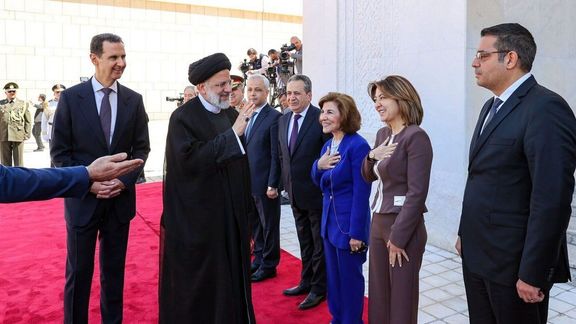
The release of Iran’s $6 billion frozen funds from South Korea has prompted a website in Tehran to ask: What about over $30 billion owed by the Syrian regime?
Aftab News, a website relatively independent of the current rulers and said to be close to other regime insiders, argued in an article published Thursday, that the outlook for Syria to pay Iran back looks bleak. Iran has a small share of Syria’s trade, roughly one-tenth of what Turkey exports to the country. Annual Iranian exports are less than $1.5 billion.
Both Iran and its ally, the government of Bashar al-Assad in Syria face serious economic challenges. Iran’s finances have steadily deteriorated since 2018 when the United States imposed sanctions after withdrawing from the JCPOA nuclear accord. Syria has remained in political limbo, insecurity, with various military groups roaming in the country and its other ally Russia weakened by its invasion of Ukraine.
United Nations envoy for Syria sounded the alarm to a worsening economic situation on Wednesday. “Prices are now spiraling out of control for essential goods such as food, medicine, fuel, basic commodities. Every part of Syria, every community, is affected,” said Geir O. Pedersen, adding many are struggling to put food on the table and feed their families.
As it usually happens, a man who is broke remembers what others owe him. So, the story goes for the Islamic Republic that aligned itself with Assad in 2011 as antiregime protests flared in the country. The clerical regime seeing its close ties with Assad as essential for its regional plans, supported Damascus with loans, free oil and tens of thousands of Iranian, Afghan, Lebanese, Iraqi and other fighters.
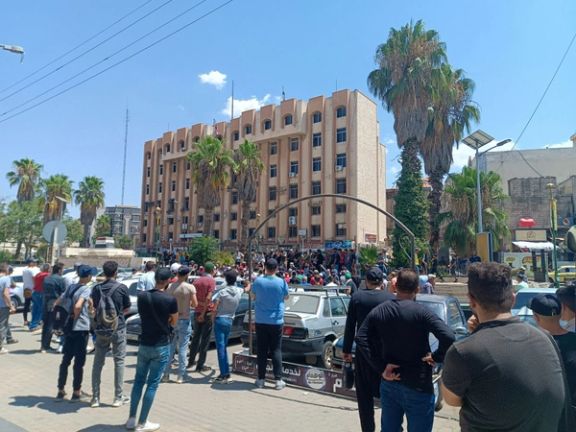
Now, when Iran suffers from a serious economic crisis some people in Tehran realize that they have spent tens of billions of dollars in Syria – a significant part of their restricted oil revenues – for a dubious outcome.
Estimates range from $30 billion to more than $50 billion material aid provided to the Assad regime. Tehran’s oil revenues in this period averaged from below $20 billion to above $40 billion annually. Therefore, it is safe to estimate that from 2011-2022 oil revenues hardly totaled $400 billion. If Iran spent $50 billion in Syria, that would be more than 10 percent of its total income from oil.
The $50 billion figure was revealed in May when an opposition hactivist group accessed government information. Minutes from a meeting of Iran’s Supreme National Security Council showed that Syria’s debt goes back to a long-term agreement signed between the two countries in January 2019, under former president Hassan Rouhani. However, the debt has been building for much longer, with roughly $11bn worth of oil given to Damascus from 2012 to 2021.
A combination of aid in the form of military support and cash, the total amount of debt to Iran is estimated to be about $50 billion, though the document said the final amount is still being calculated.
Aftab News listed an array of potentially profitable industries in Syria that Iran is interested to take under its control as compensation for money the Assad regime owes, but so far there has been no movement toward an agreement. A visit by President Ebrahim Raisi to Damascus in early May did not produce any breakthrough.
Among objects of interest to Iran are Syrian oil fields, new power stations, port facilities and mines. But Aftab News said that these need investments to become profitable, money that Iran does not have.
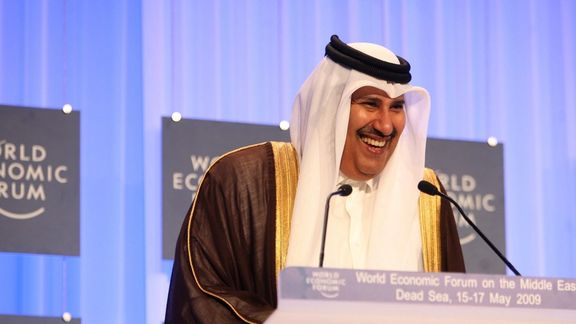
The prominent think tank Middle East Media Research Institute (MEMRI) in early August revealed that Qatar’s former prime minister made misleading remarks about Iran.
The ex-Qatari prime minister Hamad Bin Jassim, known by his initials HBJ, is currently the subject of a proposed investigation by a Beverly Hills councilmember. HBJ faces accusations of enabling terrorism and stoking antisemitism, according to MEMRI and a US congressional hearing.
HBJ plans to relocate to Los Angeles, where his luxury hotel The Maybourne Beverly Hills is located.
John Mirisch, the former mayor of Beverly Hills who now serves as a city councilmember, told Iran International, “Mr. bin Jassim’s statement is vile and yet another manifestation of the virus of Jew-hatred, something we in Beverly Hills, one of the few Jewish-majority cities outside Israel, have always condemned in the strongest of terms. I intend to ask the City Council to look into the MEMRI report, as well as Mr. bin Jassim’s remarks and to pass a resolution condemning any and all expressions of Jew-hatred, as well as any violations of human rights.”
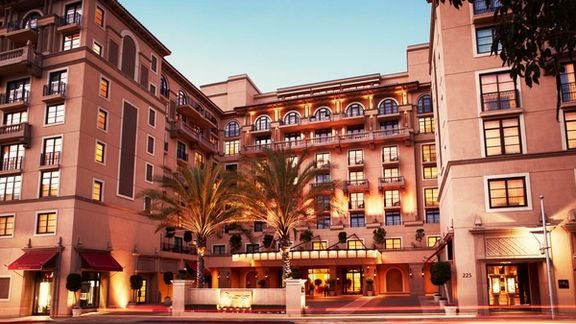
The MEMRI report Mirisch referenced is titled “ A Terror Enabler In Beverly Hills And Bel Air – Part I, “ by the president of MEMRI, Yigal Carmon.
Mirisch also condemned HBJ’s reported antisemitic comment that was disclosed in a second MEMR report released on August 17 titled “Former Qatari Prime Minister Hamad Bin Jassim – 'The Thief Of Doha' – Recounts Personal Memories In Video Interviews.”
HBJ told the Kuwaiti news outlet Al-Qabas in January 2022, “Imagine oil [was sold] by some Jews…what would be the price of a barrel of oil? It would be the most expensive thing in the world. It would be more precious than anything, like medicine.”
With respect to Qatar-Iran relations, HBJ told Al-Qabas, "I am against turning Iran into our enemy. Iran did not attack the GCC countries” and that Iran “did not attack the GCC. It did not attack Qatar. This is a simple example. It did not attack or threaten us. So why would I be hostile to Iran? I have disagreements with Iran on many issues, that’s true, but this does not mean that Iran is an enemy of mine."
MEMRI countered HBJ’s false assertion, stating, “Iran has staged multiple attacks on GCC countries by means of the Ansar Allah (Houthi) militia in Yemen—a militia that is backed and armed by Iran and acts upon its instructions. The Houthis attacked the Aramco facilities in Saudi Arabia in 2019. They also targeted Saudi and Emirati oil, water, and electric facilities in March 2022, and attacked smaller targets in 2017 and 2018. “
MEMRI added “In August 2018, Gen. Naser Sha'bani, a top official of Iran's Islamic Revolutionary Guards Corps (IRGC), admitted that the Iranian regime had ordered the Houthi militia to attack two Saudi tankers, and that it had carried out those orders. “
Fox News reported in 2019 that Qatar had advance knowledge about Iran’s attacks on Saudi, Norwegian and UAE vessels but kept the information to itself.
Qatar harbored terrorists with links to the Islamic Republic of Iran during HBJ’s tenure as foreign minister and prime minister (1992-2013), according to a 2017 congressional hearing.
One telling example was when the US Treasury sanctioned 'Abd al-Malik 'Abd al-Salam (aka Umar al-Qatari), a Jordanian with Qatari residence in 2011 and 2012, for working “with associates in Turkey, Syria, Lebanon, Qatar, and Iran to raise and move funds, weapons, and facilitate travel for fighters.”
The 63-year-old former Qatari top official has an estimated fortune worth $1.2 billion, according to a 2023 Forbes article.
When asked about the antisemitism and terrorism promotion allegations against HBJ, Blake Fox, Director of Communications for the Maybourne Beverly Hills hotel, told Iran International “Kindly note that your email has been well received. We do not have any comment to provide.”
Qatar and Iran’s regime both prescribe the death sentence for gays. HBJ upheld the lethal homophobic system in Qatar during his premiership in the tiny oil-rich country.
Karmel Melamed, an LA-based Iranian-American and award-winning journalist, told Iran International, “It's indeed sad and shameful that the current Biden administration which has long claimed to champion LGBT rights, has failed to revoke the US visa of bin Jassim … [who] has long advocated for the LGBT to be executed.”
Melamed added, “As a Los Angeles resident I'm honestly surprised that the local city government and members of the entertainment industry living here who are very supportive of LGBT rights, have not demanded bin Jassim's deportation or protested outside his hotel in Beverly Hills.”
The US State Department told Iran International “Visa records are confidential under U.S. law; therefore, we cannot discuss the details of individual visa cases.”
When asked about the MEMRI report alleging HBJ enabled terrorism, the US spokesperson said, “We have no comment on the report at this time.”
Iran International sent numerous press requests to Qatar’s embassies in Washington DC and London. Requests for comment were also sent to Qatar’s foreign ministry, to HBJ and his charity in Doha.






